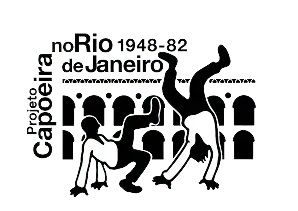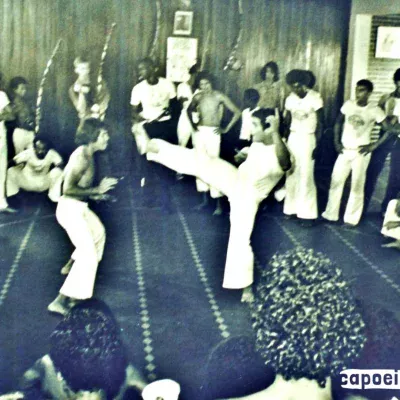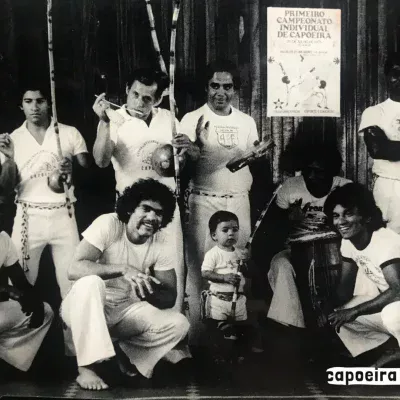By Matthias Röhrig Assunção.
One of the most famous capoeira events in Rio de Janeiro, during the 1970s, was the roda at Zé Pedro’s academy. José Pedro da Silva was, at the time, still a soldier in the Military Police of the Federal District, and from 1975 onwards, of the Rio de Janeiro State (PMERJ).
He participated in freestyle fighting contests (luta livre) broadcasted by TV Continental (Canal 9, which existed until 1972). He learned capoeira from Mário Buscapé, the leader of the Capoeiras do Bonfim group. Yet he also was a good friend of another Bahian master, Artur Emídio, which whom he even shared the space of his academy, in rua Uranos, 497, in Bonsucesso. According to Mestre Paulão Muzenza, who played in the roda at the time,
Mestre Zé Pedro was a freestyle combat and jiu-jitsu teacher, but his passion was capoeira. […] Mestre Zé Pedro played a highly bellicose capoeira.”
At the same time, he was an excellent berimbau player and had, according to Mestre André Lacé, a strong personality. All these characteristics allowed him to lead this capoeira roda which took place every Sunday, starting at ten o’clock, and which quickly became a key reference in Rio de Janeiro’s capoeira. As Mestre Valdir Sales, another participant of the roda stated: “His roda only had bambas, tough guys.”
The effervescence of Uranos St.
The most famous capoeiristas of that time in Rio de Janeiro came to play in Zé Pedro’s roda: Artur Emídio, Paulo Gomes, Mintirinha, Khorvo, Luis Malhado, Macaco Preto, Nilson Arerê, Paulão Muzenza, Moraes, Gato, Camisa, Celso, Touro and some others. Games were hard, meaning that kicks and headbutts were carried out with full contact. To the point that rather unexperienced capoeiristas would go just to watch the bambas play, or as Mestre Cobra Mansa remembers, only enter the roda at the very beginning or the very end. We do not have, however, any news of real fights taking place because everybody respected the masters in attendance. Zé Pedro’s roda took place regularly between 1973 and 1979, when its organiser decided to dedicate himself entirely to his career in the PMERJ.
Capoeiristas that played in Zé Pedro’s roda according to Master Paulão Muzenza:
Amarelinho, Altair, Artur Emídio, Baiano Anzol, Baiano do Colégio Santa Cruz, Burguês, Camisa, Canela, Celso, Corvinho, Crioulo Kapoarte, Denis, Dentinho, Djalma Bandeira, Eduardo de Celso, Gato, Gegê, Índio Aranha, Índia, Itamar, João de Celso, Julio César Figueiró, Khorvo, Luis Malhado, Macaco Preto, Medeiros, Mendonça, Mintirinha, Moraes,Mosquito, Mudinho, Nacional, Nilson Arerê, Nilton Kapoarte, Milton de Celso, Olímpio, Paulinho Godoí, Paulão Muzenza, Paulo Gomes, Peixinho da Senzala, Rui Henrique, Silas, Tabosa, Touro, Zé Maria, Ziza.
Other participants at the roda indicated by comments on this page:
Master Dentinho (Alcino Oliveira Bemvindo), Master Marquinhos Cigano.
Sources:
Photos Mestre Paulão da Muzenza collection.
M. Paulão Muzenza (Interview, 2014);
M. Valdir Sales (Interview, 2019),
M. André Lacé (Interview, 2018).
Capoeira Roda. Zé Pedro. Rio de Janeiro. Bonsucesso. Uranos Street.








